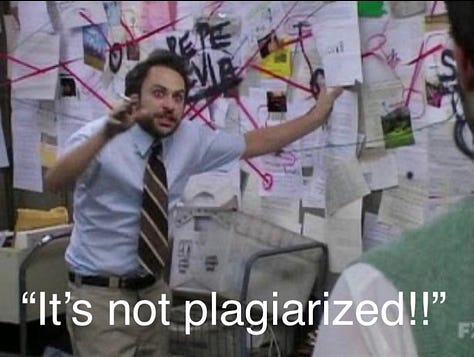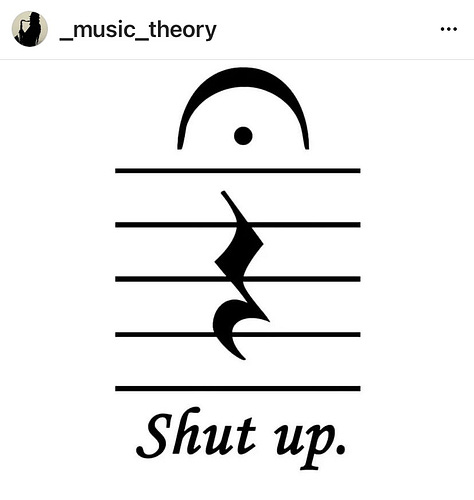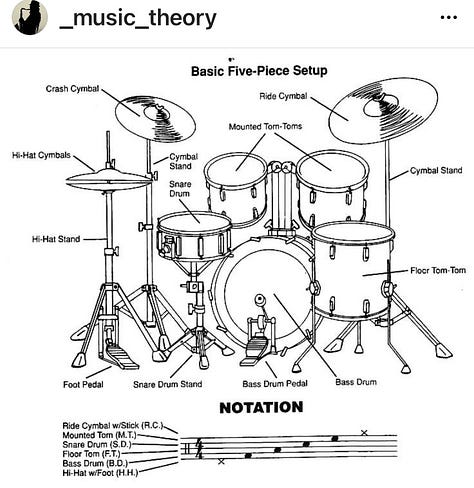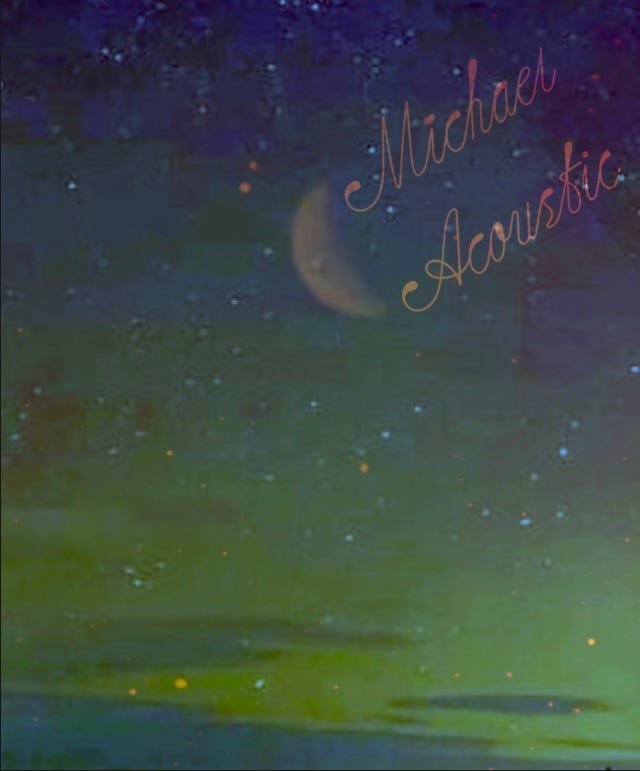Thursday Links and "It's Odds and Ends" And Something Completely Different!
I'm Glad You're Here!
If you missed it, I posted a “special edition” of Michael Acoustic regarding the jury verdict of the Ed Sheeran vs. heirs and interested parties of Marvin Gaye litigation. I note that the “jury verdict” does not set binding precedent, and if the verdict is appealed, the outcome of that may be “persuasive” outside of the 2nd Circuit. I personally would hope it is affirmed - that would relieve a lot of uncertainty about the “chord progressions possibly subject to copyright” issue.
Subsequently, I had an interesting discussion on another social media platform about how the person I was conversing with had some lyrics and a melody for a song, but the melody underneath those lyrics was probably a little too close to a hit song from years ago and this individual felt the song was a dead end due to that. I suggested contacting the label for permission or negotiating some solution. That led to a discussion about the lawyer saying regarding “turnips and watermelons” - turnips being those of us who aren’t worth suing because you "can’t get blood out of a turnip”, but watermelons are juicy targets. In this analogy, Mr. Sheeran is definitely a watermelon. I know I’m a turnip because as soon as the lawn dries out a bit, I have to go mow it. Pretty sure Mr. Sheeran doesn’t mow his own lawn. Probably none of the lawyers involved in the case do either…
Disclaimer: This Substack is free, always will be, and I receive no compensation or other benefit (except the unsolicited, occasional, and much appreciated shoutout from readers and other Substackers!) from any of the people or companies I link to or write about. Note some images and other material may be copyrighted by the original author or composer and appear here under the “Fair Use” doctrine. Link: Fair Use
Michael Acoustic
Today’s John Prine quote:
“I could never teach a class on songwriting. I’d tell them to goof off and find a good hideout.”
Some Links for today:
I know I’m beating this copyright drum a lot, but if a songwriter suddenly has a song “hit” and magically transforms from a turnip to a watermelon overnight, well, permission beats forgiveness, and a copyright should beat everything. A question I have from the Sheeran case is “How did the copyright issue fare?” We already know sound recording copyrights didn’t exist when the Marvin Gaye song was released, so that may have clouded the issue, but…
The official word from the US Copyright Office on the Music Modernization Act:
Some other lawsuits over copyright issues from the past:
"Watermelon" Copyright Lawsuits...
Last week I mentioned a couple of things I wanted to cover, but was pressing up against “email length” issues. Those items are included here:
First, we’ve talked about how Christian music, especially for contemporary worship services is pretty derivative of blues based country, rock, pop, even metal songs. Churches using copyrighted material license the music through the CCLI - Christian Copyright Licensing International:
Christian Music Copyrights through CCLI
And Christian music can be quite lucrative for songwriters:
The other thing I wanted to talk about is “reference tuning”. A4 is the “A” note above “middle C” on a piano keyboard. The frequency operates as a reference for the frequencies of notes above and below it on the keyboard, but also your Digital Audio Workstation probably uses it as the tuning reference for your recordings. What does “tuning reference” mean? It means there is a mathematical relationship between the audio frequencies we hear. To define that relationship we need a standard point of reference from which other frequencies are calculated. Western music scales contain 12 notes, the seven “naturals” - A, B, C, through G, and the five “accidentals” - the flats/sharps in the scale. There are only five accidentals because there isn’t an accidental between B and C, or between E and F. The frequency chosen for that specific “A” note (I don’t know why) as the reference is 440Hz now, but used to be (more or less) 432Hz. In Logic Pro X (and probably other DAWs - I don’t know) the reference frequency is 440Hz, but it can be adjusted by the user to the “other” frequency that used to be the standard, 432Hz, or any other frequency. The farther the adjustment, the “weirder” the intervals will sound to us, because we’ve all sort of trained ourselves to hear music referenced at 440Hz = A4 as “normal”. And that’s kinda why music from other cultures sounds different than Western music to our ears. So all this is a bit down in the audio engineering weeds, but artists and producers will sometimes record or at least mix, in both for comparison. The author discusses some of the differences and kinda skirts around how some feel the “new” 440Hz standard change from 432Hz is somehow “satanic” in nature….
For most adults who have “normal” hearing, especially after their teen years (which means some natural hearing loss has already occurred), the difference is pretty much indistinguishable.
Reference Tuning based on the A4 note
Mr. Van Veen makes a really good case here. I was surprised to learn that many independent artist never have their music professionally mastered, and I imagine that is because it can be an expenditure many just can’t afford. Still…
Some interesting stuff used by some very famous artists here:
Gear Used By "Folk Rock" Aritists
Some memes and stuff:
You can open each image in the gallery separately in a new window by shift-clicking on it, though it may work differently on different devices:








It’s Odds And Ends!
This week’s underrated or obscure band/performer:
Kate Voegele
Voegele performing at the Showbox at the Market on June 26, 2011 in Seattle, Washington
Background information:
Birth name Kate Elizabeth Voegele Born December 8, 1986 (age 36)
Bay Village, Ohio, United States
Genres Pop, pop rock, folk-pop (Ed. I did not even know this was a category….)
Occupation(s) Musician, songwriter, actress Instrument(s) Vocals, guitar, mandolin, piano Years active 2002–present Labels Interscope Website Katevoegele.com
Kate Elizabeth Voegele (/ˈvoʊ.ɡəl/; born December 8, 1986) is an American singer-songwriter and actress. She made her musical debut in 2003, with the release of her The Other Side extended play. She performed numerous local live shows to promote the album, and toured with artists such as John Mayer. In 2005, she released her second extended play, Louder Than Words. Both had local success, and helped raise awareness of Voegele as an artist. During this time period, Voegele performed at events such as Farm Aid to promote her music, and began posting her music on popular social media network MySpace. She also won numerous awards and honors for her songwriting abilities.
Don't Look Away is the debut full-length album from Kate Voegele. The album was released via MySpace Records and Interscope Records. It has sold approximately 250,000 copies worldwide to date.
Background
Voegele began work on the album in 2006, after she signed a record contract with Myspace Records and Interscope Records. The album features songs which were used on both of Voegele's extended plays. It was received well by critics and fans, who called Voegele "a breath of fresh air". The album spawned three singles, including Only Fooling Myself, Hallelujah, and You Can't Break a Broken Heart. It has sold approximately 250,000 copies to date worldwide.
(Ed. I’m not entirely sure Ms. Voegele fits in the ‘obscure” category - she has successful albums and collaborations and numerous awards and an acting career. For my readers, she may be a bit more “pop” than usually seen on these pages, but as the acoustic version of one of my favorite songs by her (below) attests - she’s got musical chops.)
I’m glad she elaborates on the inspiration/origin of the song. Also check out the gorgeous Gibson “Dove” guitar…
Regular post tomorrow!
Cheers, and keep playing!
Michael Acoustic






